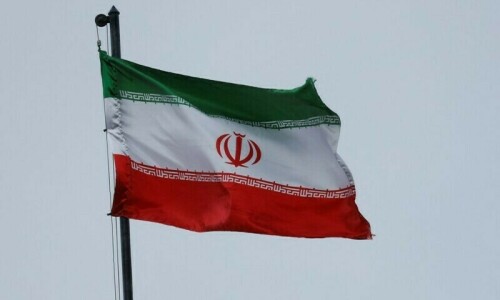
KARACHI, July 23: The turtle habitat on Sandspit and Hawkesbay beaches needs to be declared a protected area as the absence of a protective legislative instrument is a serious threat to the sustainable preservation of the habitat a large part of which is already encroached by huts, a study says.
The paper, Case study: Sandspit/Hawksbay Coastal Ecosystem as a Turtle Nesting Habitat, is sourced from the findings and assessment of two separate projects: Helping the Turtles Survive, funded under the Global Environment Facility and executed in 2004-05, and Mapping of Karachi Coast and GIS based Analysis of Marine Turtle Habitat: Sandspit/Hawksbay Eco-system (2009-10) funded by the Indus for All Partnership Fund of World Wide Fund for Nature-Pakistan.
Both projects were executed by Shehri-Citizens for a Better Environment, a non-governmental organisation.
According to the study’s findings, 52 per cent of the entire documented turtle nests along the nine-kilometre beach were located on the 0.78km long sandbar. The study found that the legally covered area allowable for 823 beach huts built on the beach stretch was 68,813 square metres while the area of actual constructed structures was 189,148 square metres. The area of extended encroached space (car park/fencing) was 256,689 square metres.
The research team also examined some key characteristics of the study area such as soil composition, groundwater level, slope and gradient and high-water mark and established linkages with turtle nesting. For instance, a direct relationship was found between increasing elevation of the sandbar and the increasing numbers of successful turtle nests and between decreasing groundwater level and increasing number of successful turtle nests.
“The significance of finding this unique and specific habitat characteristic (sandbar) and the critical linkages between the environmental, physical and human induced factors highlight the need for measures that are based on habitat planning and management in a manner that makes the area suitable for sustained and unhindered turtle nesting,” the study says.
According to the study, the case for designating the Sandspit/Hawkesbay beaches/adjacent to creeks coastal ecosystem as a protected area was principally argued on the basis that it was a globally significant green turtle nesting habitat.
“And, though, green turtles enjoyed a protected status in Pakistan, the Karachi beaches, where virtually all marine turtle nesting occur do not enjoy a protected area status. This is a serious hindrance in sustainable reservation of the habitat as it relates to regulating beach development and placing adequate environmental safeguards,” the study says.
The area recommended to be declared as protected constituted a landmass of 780 hectares located in Sohri Creek on the Karachi coast, covering part of Sandspit beach and the whole of Hawkesbay beach in addition to the backwaters (sustaining mangrove forestation).
KPT, KMC need to get involved
“Studies have been conducted in the past to determine the turtle nesting patterns and change in densities over time. However, this project (GIS-based study) for the first time tackles the extremely critical linkages that exist between the turtle habitat in terms of the physical, ecological and environmental features that determine its landscape and the changing trends and patterns in turtle nesting,” says Farhan Anwar, an urban planner and the study’s author currently associated with Shehri-Citizens for a Better Environment.
The survival of the species, he said, was linked to the protection and sustainable development of its habitat that would require continued and detailed monitoring of the physical and natural landscape and human influences and, at the same time, appropriate planning to facilitate greater suitability of the habitat for nesting.
Encroaching huts, increasing pollution, sand-digging, presence of debris and garbage and lightening at night were constant threats to the turtles, he said.
“The Karachi Port Trust and the city government, the land-owning organisations of the area, need to take up the process we have initiated and move it forward by enforcing a regulatory mechanism for turtle habitat’s protection,” he said, adding that the NGO could not succeed in its efforts to introduce changes in the lease documents that could bind people not to indulge in activities that could harm turtle habitat.
The NGO trained 60 to 80 hut security guards (chowkidars) as nvironmental stewards and also developed a habitat management plan. But so far the government has not shown any interest, he said.
“Eco-tourism with environmental safeguards has proved to be a successful concept all over the world and the same could be introduced here. Even in Karachi people do not know that we have a beach which serves as a turtle nesting area,” Mr Anwar said.
The marine turtle nesting period begins towards the end of July and picks momentum in September and November.















































